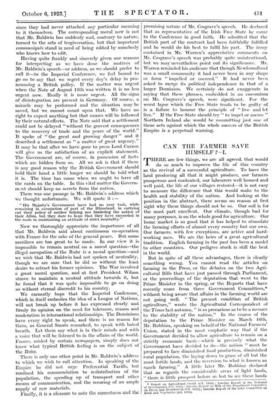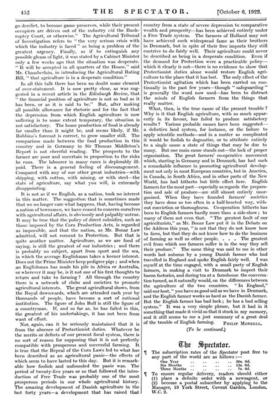CAN THE FARMER SAVE HIMSELF
THERE are few things, we are all agreed, that would do so much to improve the life of this country as the revival of a successful agriculture. To have the land producing all that it might produce, our farmers prosperous and contented, our labourers well housed and well paid, the life of our villages restored—it is not easy to measure the difference that this would make to the health and stability of the nation. And looking at the position in the abstract, there seems no reason at first sight why these things should not be so. Our soil is for the most part excellent. Our climate, though bad for many purposes, is on the whole good for agriculture. Our home market is so good that it has helped to stimulate the farming efforts of almost every country but our own. Our farmers, with few exceptions, are active and hard- working men. We are the heirs of a great agricultural tradition. English farming in the past has been a model to other countries. Our pedigree stock is still the best in the world.
But in spite of all these advantages, there is clearly something wrong. You cannot read the articles on farming iu the Press, or the debates on the two Agri- cultural Bills that have just passed through Parliament, or the proceedings of the deputation that went to the Prime Minister in the spring, or the Reports that have recently come from three Government Committees,* without being aware that affairs in the farming world are not going well. " The present condition of British agriculture," wrote the Agricultural Correspondent of the Times last autumn, " is so precarious as to be a menace to the stability of the nation." In the course of the deputation to the Prime Minister on Mardi 16th, Mr. Robbins, speaking on behalf of the National Farmers' Union, stated in the most emphatic way that if the Government decided to allow agriculture to remain on a strictly economic basis—which is precisely what the Government have decided to do—the nation " must be prepared to face diminished food production, diminished rural population, the laying down to grass of all but the most fertile lands, and the reversion to what is known as ranch farming." A little later Mr. Robbins declared that as regards the considerable areas of light lands, " there is little prospect before us but to see these lands • Report on Agricultural Credit (Cd. 1810) ; Interim Report of the Tribunal of Investigation (Cd. 1892); Interim Report on Milk of the Department Committee on Prices and Distribution (Cd. 1854); interim Report of the same Committee on Bruit and Vegetables (0.1. 1802). go derelict, to become game preserves, while their present occupiers are driven out of the industry vici the Bank- ruptcy Court, or otherwise." The Agricultural Tribunal of Investigation refers to " the very serious crisis with which the industry is faced " as being a problem of the greatest urgency. Finally, as if to extinguish any possible gleam of light, it was stated by a Cabinet Minister only a few weeks ago that the situation was desperate. " It will be accepted in all quarters of the House," said Mr. Chamberlain, in introducing the Agricultural Rating Bill, " that agriculture is in a desperate condition."
In all this talk there has been no doubt some element of over-statement. It is now pretty clear, as was sug- gested in a recent article in the Edinburgh Review, that " the financial position of agriculture is not so bad as it has been, or as it is said to be." But, after making all possible allowance for rhetoric and for the fact that the depression from which English agriculture is now suffering is to some extent temporary, the situation is not satisfactory. The home production of food is already far smaller than it might be, and seems likely, if Mr. Robbins's forecast is correct, to grow smaller still. The comparison made between the food production in this country and in Germany in Sir Thomas Middleton's Report is not cheerful reading. The prospects to the farmer arc poor and uncertain in proportion to the risks he runs. The labourer in many cases is deplorably ill- paid. There is a general feeling of discouragement. Compared with any of our other great industries—with shipping, with cotton, with mining, or with steel—the state of agriculture, say what you will, is extremely disappointing.
It is not as if we English, as a nation, took no interest in this matter. The suggestion that is sometimes made that we no longer care what happens, that, having become a nation of townsmen, we have ceased to concern ourselves with agricultural affairs, is obviously and palpably untrue. It may be true that the policy of direct subsidies, such as those imposed by the Corn Production Acts, is regarded as impossible, and that the nation, as Mr. Bonar Law admitted, will not consent to Protection. But that is quite another matter. Agriculture, as we are fond of saying, is still the greatest of our industries ; and there is probably no subject, apart from sport and the sea, in which the average Englishman takes a keener interest. Does not the Prime Minister keep pedigree pigs ; and when an Englishman has made his pile in Africa or Australia, or wherever it may be, is it not one of his first thoughts to return and take to farming ? All through the country there is a network of clubs and societies to promote agricultural interests. The great agricultural shows, from the Royal downwards, which are attended each year by thousands of people, have become a sort of national institution. The figure of John Bull is still the figure of a countryman. If, and so far as, he has failed in this, the greatest of his undertakings, it has . not been from want of effort.
Nor, again, can it be seriously maintained that it is from the absence of Protectionist duties. Whatever be the merits or defects of our present fiscal system, there is no sort of reason for supposing that it is not perfectly compatible with prosperous and successful farming. It is true that the Repeal of the Corn Laws led to what has been described as an agricultural panic—the effects of which seem to have lasted to this day. But it is remark- able how foolish and unfounded the panic was. The period of twenty-five years or so that followed the intro- duction of Free Trade was probably one of the most prosperous periods in our whole agricultural history. The amazing development of Danish agriculture in the last forty years—a development that has raised that country from a state of severe depression to comparative wealth and prosperity—has been achieved entirely under a Free Trade system. The farmers of Holland may not have achieved such widespread fame as their brothers in Denmark, but in spite of their free imports they still contrive to do fairly well. Their agriculture could never be described as being in a desperate condition. Even if the demand for Protection were a practicable policy— which it clearly is not—there is no evidence to show that Protectionist duties alone would restore English agri- culture to the place that it has lost. The only effect of the Protectionist agitation which has been carried on con- tinually in the past few years—though " safeguarding " is generally the word now used—has been to distract the minds of English farmers from the things that really matter.
What, then, is the true cause of the present trouble ? Why is it that English agriculture, with so much appar- ently in its favour, has failed to produce satisfactory results ? Various probable causes have been suggested--a defective land system, for instance, or the failure to apply scientific methods—and in a matter so complicated it would be foolish to dogmatize, or to attribute entirely to a single cause a state of things that may be due to many. But one main cause stands out—the lack of proper organization. The great farmers' co-operative movement which, starting in Germany and in Denmark, has had such a remarkable influence in promoting agricultural develop- ment not only in most European countries, but in America, in Canada, in South Africa, and in other parts of the New World, has had hitherto but little effect here. English farmers for the most part—especially as regards the prepara- tion and sale. of produce—are still almost entirely unor- ganized. When they have founded farmers' societies they have done so too often in a half-hearted way, with- out conviction or thoroughness. Co-operation hitherto has been to English farmers hardly more than a side-show ; to many of them not even that. " The greatest fault of our agriculturists," as Mr. Bonar Law put it in the Debate on the Address this year, " is not that they do not know how to farm, but that they do not know how to do the business of farming as well as other people. . . The greatest evil from which our farmers suffer is in the way they sell their produce." The same thing was said to me in other words last autumn by a young Danish farmer who had travelled in England and spoke English fairly well. I was myself at the time engaged, with a small party of English farmers, in making a visit to Denmark to inspect their bacon factories, and during tea at a farmhouse the conversa- tion turned, as it naturally would, on the differences between the agriculture of the two countries. " In England," said our host, " you have as good soil as we have in Denmark, and the English farmer works as hard as the Danish farmer. But the English farmer has bad luck ; he has a bad selling system." It was a very simple phrase, but it had in it something that made it vivid so that it stuck in my memory, and it still seems to me a just summary of a great deal of the trouble of English farming. pump MORRELL.
(To be continued.)











































 Previous page
Previous page